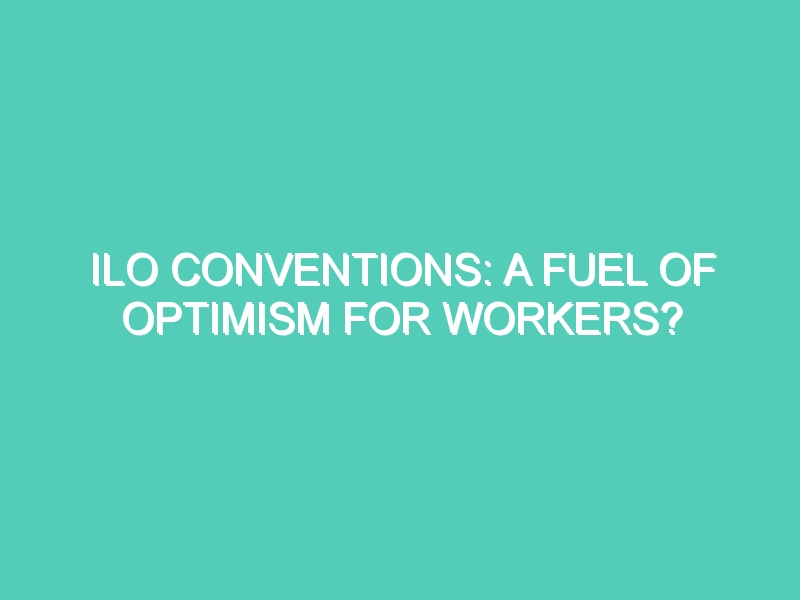INTRODUCTION
Work – whether you got it, need it, or depend on others to have it, work is central to your well-being. Work gives our lives purpose, dignity, and our humanity. Millions of people need work, millions have work but people live in poverty.The right of workers encompasses an array of Human Rights that are incorporated to protect the workers. Hundreds of millions lack the basic labour rights for a healthy, safe, and secure living.
INTERNATIONAL LABOUR ORGANISATION
The International LabourOrganisation is the UN agency for the world of work. It was founded on the belief that social justice is an essential component for universal and lasting peace.
The ILO promotes decent work for all through an agenda that aims to give people a fair stake in their working lives and in society. Created in 1919 as a part of the treaty of Versailles to ensure social justice to people at work, the ILO is a specialized agency with a membership of 187 countries.
Recognized as the world’s authority of work. Its impact is seen at key moments in history. Unique as government and employers both have equal voices. Work together to create labor standards and policies that impact today’s global economy. In 2008 ILO adopted a Declaration on Social justice for fair globalization. The decent work became the core of ILO policy and agenda were accordingly put into practice.
Four strategic objectives of the decent work agenda-
- Promote decent employment opportunities
- Enhance social protection
- Strengthen the tripartite system and social dialogue
- Guarantee fundamental principles and rights at work.
This work agenda is an essential contribution for peace and security, to sustainable economic growth and dignity of men and women. The world of work is changing rapidly and the need for protection and enhancement of rights of workers is transpicuous.
Mechanism of tripartite where government, employers, and union work together, It works towards the worker who is exploited with no consideration for their health, their family lives or their professional and social advancement.
At present, the ILO has 187 members including India which is a founder member. The principal means of action in the ILO means setting up into labour standards in the form of conventions and recommendations.
INTERNATIONAL LABOUR ORGANISATION CONVENTIONS
Conventions are international treaties and instruments which create legally binding obligations on the countries that ratify them. The ILO instruments have provided guidelines and a useful framework for the evolution of legislative and administrative measures for the protection of the advancement of the interest of the workers. The question pertinent to this is – How are International Labor standards made?
The Conventions are drawn up by the representatives of the government, employers, and workers and are adopted at the ILO conference. Once adopted a standard has to be submitted by the member states to their competent authorities for consideration. For convention for ratification.The ratifications of ILO convention are voluntary. The ratification is a formal procedure whereby a state accepts the convention as a legally binding instrument. A county is subject to ILO’s regular supervisory system responsible for ensuring that ratified conventions are applied.
Source – Open Global Rights
Subject acting as the core of international labor standards concerning worker’s rights are-
- Freedom of Association, Collective Bargaining, and industrial relations
- Elimination of forced labor
- Abolition of child labor and protection of children and young persons
- Equality of opportunity and treatment
- Tripartite consultation
- Labor administrative and inspection
- Employment policy and promotion
- Vocational guidance and training
- Employment security
- Wages
- Working time
- Occupational safety and health
- Social security
- Maternity protection
- Social policy
- Migrant workers
- Fishermen
- Seafarers
- Dockworkers
- Indigenous and tribal people
- Specific categories of workers
INTERNATIONAL LABOUR STANDARDS
The International Labor Organization has ardently developed the system of International Labor Standards to bring the most highlighted issue of rights of workers in light. It introduced the key constituents and identified 8 fundamental conventions in support of workers.
The 8 core conventions of ILO also called as fundamental/ human rights conventions are:
1. Freedom of Association and Protection of the Right to Organise Convention, 1948 (No. 87)
2. Right to Organise and Collective Bargaining Convention, 1949 (No. 98)
3. Forced Labour Convention, 1930 (No. 29) (and its 2014 Protocol )
4. Abolition of Forced Labour Convention, 1957 (No. 105)
5. Minimum Age Convention, 1973 (No. 138)
6. Worst Forms of Child Labour Convention, 1999 (No. 182)
7. Equal Remuneration Convention, 1951 (No. 100)
8. Discrimination (Employment and Occupation) Convention, 1958 (No. 111)
Source -: ILO Ratifications on NORMLEX
Convention no. 87 concerning freedom of association and protection of the rights to organize provides for the rights the workers and employers without any distinction to establish and join the organization of their own choosing without previous authorization. Their organizations have the right to form or join federation and confederation including those at the international level.
ILO convention no. 138 concerning minimum age for entering employment and work was adopted by an international labor conference at its 58th session in June 1973. This convention is one of the 8core conventions of the ILO being referred to as fundamental or basic human rights convention and ILO is very active in promoting in its ratification.
Each country ratifying this convention undertakes to; Pursue national policy designed to ensure the effective abolition child labour; Specify a minimum age to entry to employment or work which will not be less than ages of completion of compulsory schooling;
To raise this progressively to a level consistent with the fullest physical and mental development of young people; guarantee that minimum age of entry to any type of employment or work. Which is likely to compromise to health, the safety or morals of the young people shall not be less than 18 years.
ILO convention no. 182 concerning the worst form of child labor was adopted at the ILO conference in its 87th session at Geneva in June 1999.
The main provision of this convention are;
For the purpose of this convention, the term child shall apply to all person under the age of 18For the purpose of this convention the term worst form child labor comprises; All forms of slavery or practices similar to slavery such as the sale of trafficking the children (debt bondage and serfdom and forced or compulsory labor) including forced or compulsory recruitment of children for use in armed conflict. The use, procuring or offering of a child for illicit activity, in particular of the production or trafficking of drugs as defined in the relevant international treaties.
CONCLUSION
The convention promulgated by the ILO has brought justice to the workers in various countries who have ratified them. The need for fairness arises in every aspect. Recently, a new convention has been introduced by the ILO in 2019. The International LabourOrganisation convention on ‘violence and harassment’ is yet another global treaty that is groundbreaking. The adoption of this treaty outlines the overwhelming aspect of the protection of employees at their workplace. This treaty covers in its ambit all the employers, workers, trainees who have been employed the ILO has found many lacunas relating to the unbiased treatment of workers due to which it has come up with this new instrument framing mechanisms and relief for workers raising their voice against unacceptable violence this is indeed another step forward by ILO in advocating for rights of workers and ensuring the enforcement of equal rights of workers enabling them to work in a productive environment.
Article Written By- Deepanshi Kalra
(HRDI Work From Home Internship)



